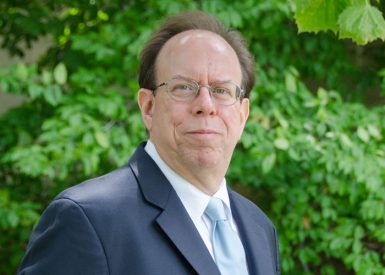Fargo: Technological advances raise new First Amendment questions
Fake news, Amazon’s Alexa and the power of Facebook are all emerging issues in the world of First Amendment theory, said associate professor Tony Fargo.

Fargo’s talk, “Changing the First Amendment Narrative,” during the Nov. 16 research colloquium addressed these issues and other new topics on press and speech freedom.
There are many different ideas about why the First Amendment is important and what its purpose is, he said, and these ideas are evolving along with new technologies and ways of communicating.
Some of the most popular theories are the marketplace of ideas, self-government and the role of the media in checking government power.
“Bottom line is: There is nothing in the original writing of the First Amendment that tells us what its central purpose is,” Fargo said.
Court rulings such as New York Times Co. v. Sullivan — which established the actual malice standard — and the Pentagon Papers case have helped illuminate how the Supreme Court has traditionally interpreted the First Amendment and its protections.
But technology may be complicating even these semi-established ideas, Fargo said.
“We’re in an age right now where we communicate a lot with social media, and social media tends to blur the lines of public and private spheres,” he said.
He pointed to Facebook as a primary example, and he talked about how he can log on and see news articles about politics, job openings, photos of someone’s breakfast and a baby announcement, all in a row. Is this a public or private sphere, or is it both?
The case Packingham v. North Carolina broached these ideas when the state outlawed sex offenders’ use of social media. The court found the law unconstitutional.
“The court said, ‘They can’t ban somebody from using social media, because social media are a new public forum,’” Fargo said.
Other new First Amendment issues include questions about what protections are offered to media companies in an era of digital convergence in which a newspaper also broadcasts and publishes online.
“What happens when a newspaper is not just a newspaper?” Fargo said. “What if it has a website or a podcast? The laws under the Supreme Court’s interpretation are vastly different between different media.”
The global nature of the internet also poses potential issues.
“Online media by their very nature are global,” he said. “The First Amendment protects your right to speak in the United States, but when you speak on the internet, you’re essentially speaking to the world.”
Essentially, First Amendment questions about these situations, along with issues such as fake news, the Internet of Things, Amazon’s Alexa and artificial intelligence, could all change the way the First Amendment is interpreted and applied, he said.
“These are all things we have to consider as the First Amendment progresses along its path through the 21st century,” he said.
More:

